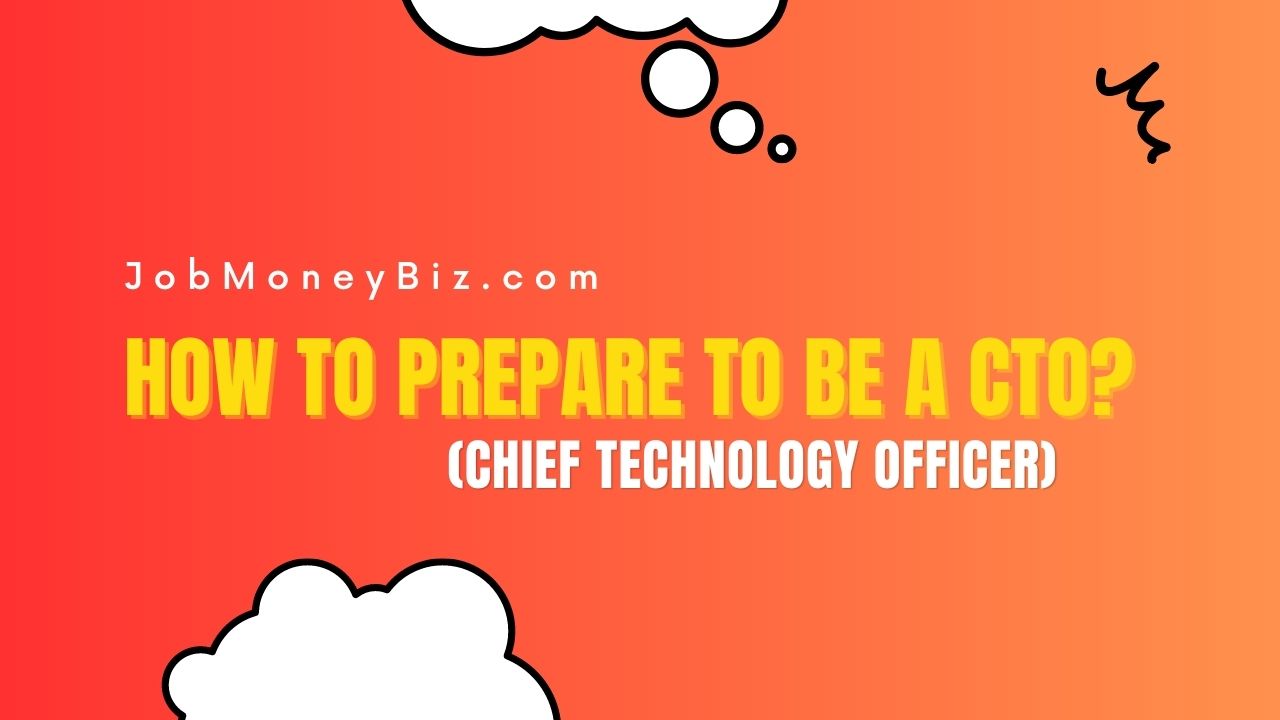Becoming a Chief Technology Officer (CTO) is a dream for many technology enthusiasts. The role of a CTO is crucial in driving technological innovation and strategy within an organization. However, preparing for such a position requires careful planning and acquiring the necessary skills and experience. In this article, we will explore the steps you can take from the beginning of your tech career to set yourself on the path to becoming a successful CTO.
- How to Be a CTO (Chief Technology Officer) | Huge Career Guide for CTO Aspirants
- How to Be a CTO (Chief Technology Officer) – steps to Take from the Beginning of a Tech Career?
- FAQs
- Q: What educational background is required to become a CTO?
- Q: Can I become a CTO without prior management experience?
- Q: Is it necessary to specialize in a specific technology to become a CTO?
- Q: How important is networking for aspiring CTOs?
- Q: What are the key qualities of a successful CTO?
- Q: How can I demonstrate my readiness for a CTO role?
- Conclusion
How to Be a CTO (Chief Technology Officer) | Huge Career Guide for CTO Aspirants
The Importance of Building a Strong Foundation
To prepare for a career as a CTO, it is essential to establish a strong foundation in technology. This includes acquiring a solid understanding of programming languages, software development methodologies, and infrastructure systems. By mastering the fundamentals, you lay the groundwork for advanced knowledge and expertise.
Gaining Technical Expertise
To be an effective CTO, you must possess in-depth technical expertise. It is crucial to continuously enhance your knowledge in areas such as cloud computing, artificial intelligence, cybersecurity, and data analytics. Staying up to date with emerging technologies will enable you to make informed decisions and drive innovation within your organization.
Developing Leadership and Management Skills
As a CTO, you will be responsible for leading teams and managing projects. Developing strong leadership and management skills is vital for success in this role. This includes cultivating effective communication, decision-making, and problem-solving abilities. Additionally, honing your strategic thinking and vision-setting capabilities will help you steer your organization toward technological excellence.
Building a Professional Network
Networking plays a significant role in career advancement. Actively participating in industry events, conferences, and professional organizations allows you to connect with like-minded professionals and experts. Building a robust network can open doors to new opportunities, collaborations, and mentorship.
Embracing Continuous Learning
The tech industry is constantly evolving, and as a CTO, it is crucial to embrace continuous learning. Stay updated with industry publications, research papers, and online learning platforms. Engage in relevant courses, certifications, and workshops to enhance your skills and broaden your knowledge base.
Staying Abreast of Technological Advancements
To excel as a CTO, you must remain at the forefront of technological advancements. Regularly monitor industry trends and innovations. Engage with technology forums, blogs, and podcasts to gain insights from thought leaders. This knowledge will empower you to make informed decisions and guide your organization toward adopting cutting-edge technologies.
Balancing Technical and Business Knowledge
As a CTO, you must bridge the gap between technology and business objectives. Strive to acquire a deep understanding of your organization’s industry, market dynamics, and competitive landscape. This knowledge will help you align technology strategies with the overall business goals, ensuring maximum impact and value.
Nurturing Communication and Interpersonal Skills
Effective communication and interpersonal skills are essential for any leadership position, including the role of a CTO. Develop the ability to convey complex technical concepts in a clear and concise manner. Foster strong relationships with stakeholders, team members, and executives through active listening, empathy, and collaboration.
Emphasizing Problem-Solving Abilities
Problem-solving is at the core of a CTO’s responsibilities. Enhance your problem-solving skills by seeking out challenging projects and assignments. Learn to approach problems analytically, break them down into manageable components, and devise effective solutions. This skill will be invaluable in your journey toward becoming a CTO.
Showcasing Project Management Capabilities
Project management skills are crucial for successfully executing technology initiatives. Familiarize yourself with project management methodologies, tools, and best practices. Demonstrate your ability to lead cross-functional teams, manage resources, and deliver projects within budget and timelines.
Demonstrating a Strategic Mindset
As a CTO, you must think strategically and align technology initiatives with long-term organizational goals. Develop a keen understanding of your company’s vision and objectives. Use this knowledge to drive technology strategies that contribute to the growth and success of the organization.
Fostering Innovation and Creativity
Innovation and creativity are the cornerstones of technological advancement. Encourage a culture of innovation within your organization by fostering an environment that values experimentation, rewards creativity, and embraces calculated risks. As a CTO, your ability to inspire and nurture innovation will be instrumental in driving your organization’s success.
Managing Stakeholder Expectations
Managing stakeholder expectations is critical for the smooth implementation of technology initiatives. Develop strong stakeholder management skills by actively engaging with key stakeholders, understanding their needs, and aligning technology solutions to meet those expectations. Effective stakeholder management will help build trust and ensure the successful adoption of technological changes.
Understanding Industry Trends and Market Demands
To be a successful CTO, you must have a finger on the pulse of industry trends and market demands. Stay informed about emerging technologies, competitor strategies, and customer preferences. This knowledge will enable you to proactively identify opportunities for innovation and ensure your organization remains competitive.
Adapting to Change and Overcoming Challenges
The tech industry is characterized by rapid change and constant challenges. As a CTO, you must be adaptable and resilient in the face of adversity. Embrace change, learn from failures, and use setbacks as opportunities for growth. Your ability to navigate uncertainty and overcome challenges will set you apart as a strong leader.
Gaining Business Acumen
To effectively lead technology initiatives, a CTO must possess strong business acumen. Familiarize yourself with financial management, budgeting, and cost optimization principles. Understand the impact of technology investments on the organization’s bottom line. This holistic understanding of business operations will enable you to make informed decisions and drive value.
Building a Personal Brand
A strong personal brand can significantly enhance your professional growth and visibility. Establish yourself as a thought leader in your field by sharing your insights through blog posts, articles, and speaking engagements. Leverage social media platforms to showcase your expertise and connect with industry peers.
Seeking Mentorship and Guidance
Seeking mentorship from experienced professionals can provide invaluable guidance and accelerate your career growth. Identify mentors who have achieved success as CTOs or in related leadership roles. Learn from their experiences, seek their advice, and grow.
Exploring Diverse Opportunities
To prepare for a career as a CTO, it’s essential to gain exposure to diverse opportunities within the tech industry. Seek out roles that allow you to work on different projects, technologies, and domains. This breadth of experience will broaden your perspective and equip you with a versatile skill set.
Showcasing Results and Achievements
As you progress in your tech career, it’s crucial to showcase your results and achievements. Keep a record of successful projects, innovative solutions, and measurable outcomes. Highlight these accomplishments in your resume, portfolio, and professional profiles. By demonstrating tangible results, you will establish yourself as a credible candidate for a CTO role.
Leveraging Data and Analytics
Data-driven decision-making is integral to the role of a CTO. Familiarize yourself with data analysis tools, statistical methods, and data visualization techniques. Learn to derive meaningful insights from data and leverage them to drive strategic technology initiatives.
Balancing Short-Term and Long-Term Goals
As a CTO, you must strike a balance between short-term and long-term goals. While it’s essential to address immediate technology needs, you must also think ahead and plan for the future. Develop a roadmap that outlines your vision for technology adoption and innovation, ensuring that it aligns with the organization’s long-term objectives.
Cultivating a Positive Work Culture
As a leader, you have the power to shape the work culture within your organization. Cultivate a positive and inclusive environment that fosters collaboration, creativity, and continuous learning. Encourage open communication, recognize and reward achievements, and provide opportunities for professional growth. Positive work culture will attract top talent and contribute to the overall success of your organization.
Being Agile and Flexible
In today’s fast-paced tech landscape, agility and flexibility are essential qualities for a CTO. Embrace agile methodologies and practices that promote iterative development, rapid prototyping, and quick adaptation to change. Foster a culture of flexibility and empower your team to respond swiftly to evolving market demands.
Taking on Leadership Roles
To prepare for a CTO position, actively seek out leadership opportunities. Volunteer to lead cross-functional projects, mentor junior team members, or participate in industry committees. These experiences will help you develop your leadership skills, gain visibility, and demonstrate your ability to take on higher-level responsibilities.
How to Be a CTO (Chief Technology Officer) – steps to Take from the Beginning of a Tech Career?
Preparing to be a CTO from the beginning of a tech career requires a combination of technical expertise, leadership skills, and business acumen. By building a strong foundation, gaining relevant experience, and continuously upgrading your skills, you can position yourself for success in this coveted role.
FAQs
Q: What educational background is required to become a CTO?
A: While there is no specific educational path for becoming a CTO, most successful CTOs possess a bachelor’s or master’s degree in computer science, information technology, or a related field. However, practical experience, industry certifications, and continuous learning are equally important in building a successful career as a CTO.
Q: Can I become a CTO without prior management experience?
A: While prior management experience is beneficial, it is not always a prerequisite for becoming a CTO. Strong technical expertise, leadership potential, and a willingness to learn can compensate for the lack of formal management experience. Taking on leadership roles within projects or volunteering for leadership opportunities can help you develop the necessary skills.
Q: Is it necessary to specialize in a specific technology to become a CTO?
A: While specialization in a specific technology can be advantageous, it is not mandatory to become a CTO. As a CTO, you need to have a broad understanding of various technologies and their applications. Focus on gaining a diverse set of technical skills and developing the ability to adapt to new technologies and trends.
Q: How important is networking for aspiring CTOs?
A: Networking plays a crucial role in career advancement for aspiring CTOs. Building a strong professional network allows you to connect with industry experts, mentors, and potential collaborators. Attend industry events, join professional organizations, and engage in online communities to expand your network and stay updated with industry trends.
Q: What are the key qualities of a successful CTO?
A: Successful CTOs possess a combination of technical expertise, leadership skills, strategic thinking, and the ability to drive innovation. They are effective communicators, problem-solvers, and decision-makers. Additionally, they exhibit adaptability, agility, and a continuous learning mindset to navigate the ever-changing tech landscape.
Q: How can I demonstrate my readiness for a CTO role?
A: To demonstrate your readiness for a CTO role, focus on showcasing your technical expertise, leadership capabilities, and business acumen. Highlight your experience in leading technology projects, driving innovation, and delivering measurable results. Emphasize your ability to align technology strategies with business objectives and effectively communicate with stakeholders.
Conclusion
Becoming a CTO is an exciting and challenging career path. By following the steps outlined in this article, you can prepare yourself from the beginning of your tech career to take on the responsibilities of a CTO. Continuously upgrade your technical skills, develop your leadership abilities, and stay ahead of industry trends. With dedication, perseverance, and a passion for technology, you can position yourself for a successful journey toward becoming a CTO.
Anupam M is blogging on this site on different aspects of technology, job, and business. He is an experienced IT professional with an Engineering degree from a premier NIT. Know more



